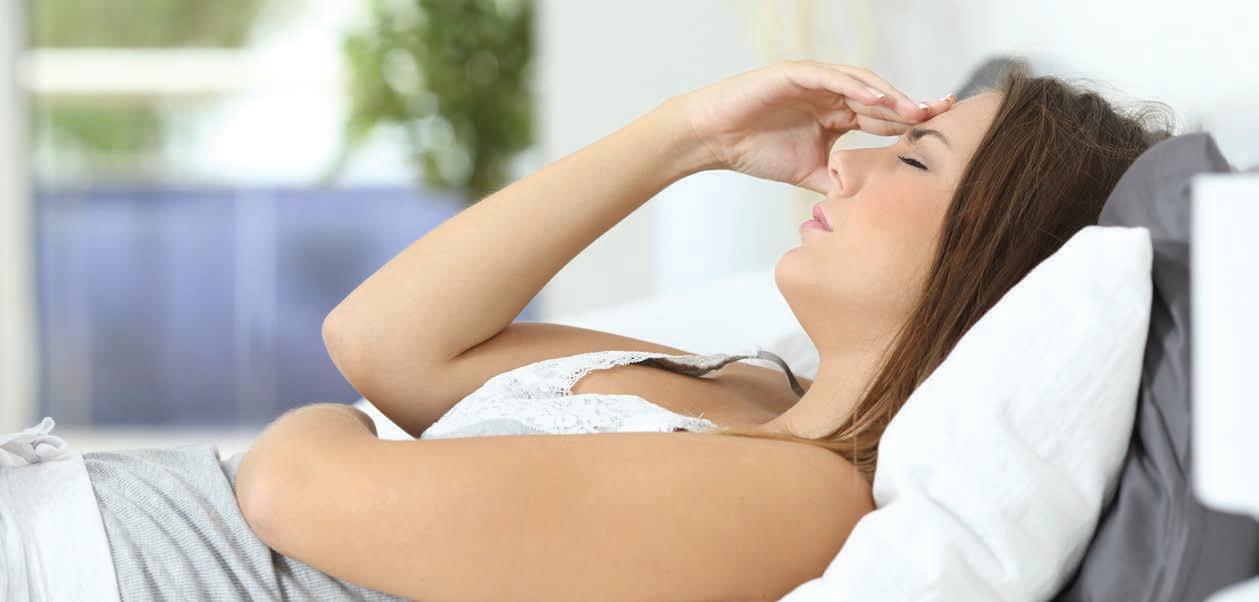
4 minute read
Natural Treatment for Menstrual Migraines
By Nicole Kerr, ND
According to the National Headache Foundation, approximately 60% of women suffering from migraines get menstrual migraines. Menstrual migraines can start two days before the period begins and up to three days after the period ends. Hormones can trigger menstrual migraines during ovulation, menses, perimenopause and menopause. Symptoms include: one-sided, throbbing, nausea inducing with or without vomiting, sensitivity to light and sound.
Advertisement
Migraine Triggers
Migraine diaries are a great way to evaluate the cause of your migraines. Common triggers for migraines that are not hormone related include: poor sleep, alcohol, high tyramine foods, smoked or cured meat, banana, avocado, chocolate, excessive caffeine, changes in weather, stress, food additives like MSG, artificial sweeteners, inhaling strong odors, missing meals, and fatigue. A diary can help rule out any of these culprits as additional contributing factors of migraines.
Hormone Levels
If you suffer migraines and are on hormonal birth control, you need to discuss the option of a low estrogen pill with your prescribing doctor. Reducing the amount of estrogen in your monthly birth control can help reduce menstrual migraines and also lower your chances of ischemic stroke. Women suffering migraines with aura are at a higher risk of ischemic stroke when using combined oral contraceptives, according to American College of Cardiology. Those not on hormonal birth control are often encouraged to go on birth control to regulate their migraine symptoms, but there are other options.
Having your hormone levels evaluated through bloodwork, urinary testing or salivary testing is the first step to correcting menstrual migraines. Looking at other blood levels may be performed too, such as serotonin metabolite level and red blood cell magnesium. Serotonin is the primary hormonal trigger for headaches and is believed by some researchers to be an inherited disorder that affects the way serotonin is metabolized. Estrogen is the primary hormone causing menstrual migraines, though progesterone level changes may also play a part for some women. Most people don’t know only 1% of serotonin in the human body is in the central nervous system, the other 99% is found in other tissues, primarily plasma, the gastro-intestinal tract, and immune tissues.
Estrogen and Serotonin Connection
Serotonin acts as a hormone regulating various physiological functions including vasodilation, clotting, recruitment of immune cells, gastro-intestinal motility and initiation of uterine contraction. Estrogen affects how serotonin receptors are distributed and function in the body and concentrations of serotonin can be altered with natural and pharmacological estrogen. Imagine correcting the hormonal status of estrogen to then see mood, PMS, menstrual migraine and other undesired menstrual symptoms resolve because serotonin is functioning optimally in the body. Once hormone levels have been evaluated, treatment options may include vitamins, supplements, herbal formulas, and bodywork therapies.
Supplements and Therapies
1. Magnesium is an important nutrient to supplement in many migraine patients.
The form of magnesium used for migraines will determine its effectiveness. 2. CoQ10 is used as a preventative therapy of migraine through its anti-oxidative effects and impact on mitochondrial health. 3. Vitamin B2 (riboflavin) studies show a reduction in the frequency and duration of migraines due to it improving mitochondrial function.

Live Your Best Life
Brigitta Jansen MS CDN
Certified Nutritionist
917.975.1784 info@jansennutrition.com • Reach your Ideal Weight • Reduce Inflammation & Pain • Lower Blood Pressure & Sugar • Eliminate Food Sensitivities • Heal your Gut
Natural Nutmeg Wants You!
We are seeking a positive, enthusiastic, goal-oriented advertising sales/marketing professional. Responsible for networking, generating leads and consultative sales. Candidate should be self-motivated and be able to work on a collaborative team. Work from home opportunity and commission only.
Please send cover letter and resume to Dr. Diane Hayden @ diane@naturalnutmeg.com.
4. Butterbur is an herb that has been shown to reduce the number of migraines and make them less severe. 5. Exercise may relieve hormonally triggered migraines. Making sure to stay hydrated is very important. Meditation, yoga, and deep breathing can help reduce stress improving hormonal dysfunctions that result in menstrual migraines. 6. BioFeedback has benefi ts in improving migraines by allowing you to monitor your response to stress. Biofeedback stabilizes the sensitive nervous system of the migraineur between migraines; lessens the frequency of migraine; and increases the migraineur’s sense of control. 7. Acupuncture is an alternative treatment used to treat and prevent menstrual migraines.
8. Traditional Chinese Medicine (TCM).
Symptom presentation, timing of migraine in the cycle, and observation of the tongue and pulse are important in properly diagnosing menstrual migraine in TCM. Excessive physical work and emotional stress are general causes of menstrual migraines in TCM.
Noting the nuances of the migraine sufferer allows the TCM practitioner to develop the best acupuncture and herbal protocol. Menstrual migraines can be a big problem/inconvenience for many women. Have your hormones evaluated to get to the bottom of your monthly migraines. Relief from menstrual migraines does exist, fi nd a practitioner you trust so you can start feeling better today. Dr. Nicole Kerr provides a balanced blend of Naturopathic and Traditional Chinese Medicine therapies at Pediatric & Family Center for Natural Medicine. Dr. Kerr focuses her practice at Pediatric & Family Center for Natural Medicine on women’s health, male and female fertility, migraines, and anxiety. Pediatric & Family Center for Natural Medicine treats children and adults of all ages and aliments.857 N. Main St. Ext. Suite 2, Wallingford. 203-265-0444 www.naturopathicanswer.com. See ad on page 30.










